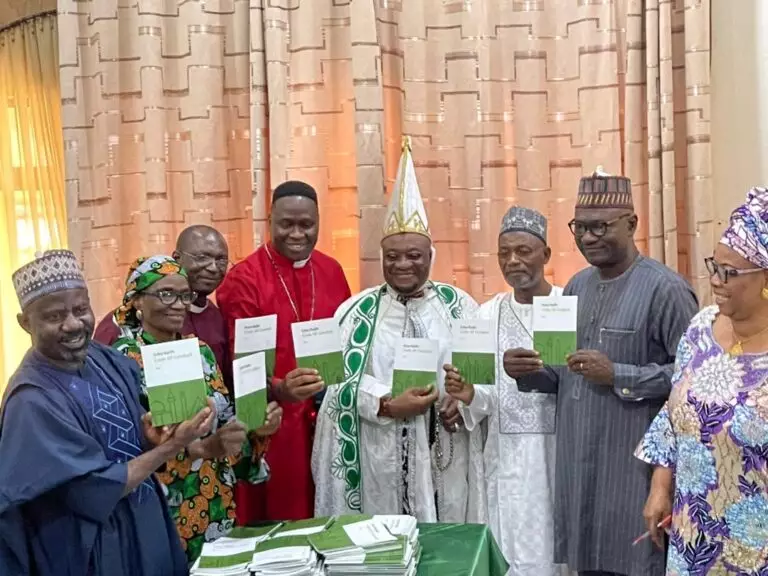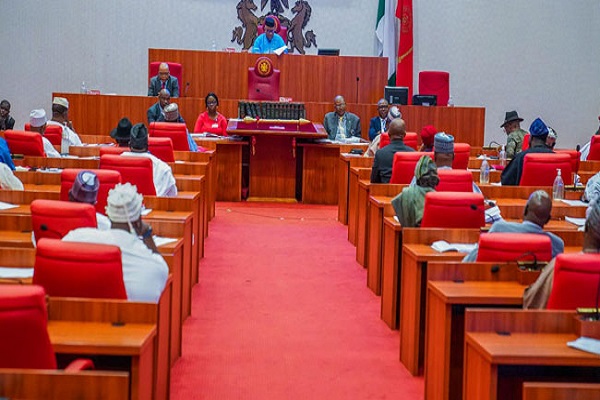News
Intefaith Forum unveils code for religious cooperation, peace building

(Photo: Central Coordinating Council of IDFP.)
The Interfaith Dialogue Forum for Peace (IDFP), has rolled out a code of conduct to guide religious groups and leaders, so as to enhance interfaith cooperation and peace building in the country.
The Co-Chairman of forum, Dr Yusuf Arrigassinu said on Wednesday in Abuja that the aim was to create an environment of mutual respect, cooperation, and harmony for a stronger and united Nigeria.
He urged religious leaders, interfaith community members, and all concerned citizens to embrace the principles outlined in the Code of Conduct.
Arrigassinu called for sound ethical and values-based decisions geared towards a more united and harmonious Nigeria.
“IDFP is thrilled to announce the launch of the Interfaith Code of Conduct, a momentous initiative that seeks to foster unity and peaceful coexistence among religious communities in Nigeria.
“The code serves as a guiding light, inspiring religious leaders to uphold shared values and promote a climate of understanding and harmony.
“This landmark initiative underscores IDFP’s unwavering commitment to fostering understanding, harmony, and cooperation through open dialogue among Nigeria’s diverse religious communities,” Arrigasiyyu said.
He urged the media to give the document wide publicity and for churches, mosques and schools to use it in promoting cooperation among Nigerians.
Also, Rev. John Hayab, the Co-coordinator, Central Coordinating Council of IDFP said that the forum remained committed to what will make a difference in the country.
He said that the forum was also committed to showing the people the right direction to follow as a country.
In his remarks, Bishop Sunday Onuoha, a former Co-chairman of the forum, urged governments at all levels to hold people responsible for their utterances.
He said that people should not be allowed to create conflicts in the country under the guise of religion or politics.
The cleric suggested that the code of conduct should be made available in schools, places of worship, hotels and other public places for all Nigerians to read and practice.
He said all Nigerians should be guided by the code, saying that for the country to develop, there was need for peace in the land.
Onuoha said that the document showed that Christians and Muslims in Nigeria can come together for progress, adding that Nigeria is not a theater of religious conflicts.
Also, Imam Fuad Adeyemi said that Christians and Muslims must emphasise the many similarities and common ggrounds between them.
“We do not have any other place except Nigeria and Christians and Muslims must come together to develop the country,” he added.
Headline
Prince Harry visits sick Nigerian soldiers in Kaduna

Prince Harry and his team visited the 44 Nigerian Army Reference Hospital in Kaduna to interact with wounded soldiers who are receiving treatment.
The Duke of Sussex is in Nigeria with his wife to champion the Invictus Games, which Harry founded to aid the rehabilitation of wounded and sick servicemembers and veterans.
Nigeria joined the Invictus Community of Nations in 2022 becoming the first African country to join.
Prince Harry’s visit to Kaduna came 68 years after his late grandmother Queen Elizabeth II visited the state during the time of the late Premier of Northern Region Sir Ahmadu Bello.




News
Senate approves death penalty for drug traffickers

Senate on Thursday, May 9, approved the death penalty for those convicted on the charge of drug trafficking in the country.
The punishment prescribed in the extant NDLEA Act is a maximum sentence of life imprisonment.
The resolution of the Senate followed its consideration of a report of the Committees on Judiciary, Human Rights and Legal Matters and Drugs and Narcotics, National Drug Law Enforcement Agency (NDLEA) Act (Amendment) Bill, 2024.
The Chairman of the Committee on Judiciary, Human Rights & Legal Matters presented the report during plenary, Senator Mohammed Monguno (APC-Borno North).
The bill, which passed its third reading, aims to update the list of dangerous drugs, strengthen the operations of the NDLEA, review penalties, and empower the establishment of laboratories.
Section 11 of the current act prescribes that “any person who, without lawful authority; imports, manufactures, produces, processes, plants or grows the drugs popularly known as cocaine, LSD, heroin or any other similar drugs shall be guilty of an offence and liable on conviction to be sentenced to imprisonment for life” was amended to reflect a stiffer penalty of death.
Although the report did not recommend a death penalty for the offence, during consideration, Senator Ali Ndume moved that the life sentence should be upgraded to the death penalty.
During a clause-by-clause consideration of the Bill, Deputy Senate President Barau Jibrin, who presided over the session, put the amendment on the death penalty to a voice vote and ruled that the “ayes” had it.
But Senator Adams Oshiomhole objected to the ruling, saying that the “nays” had it.
He argued that matters of life and death should not be treated hurriedly, but Barau said it was too late, as he failed to call for division immediately after his ruling.
The bill was subsequently read for the third time and passed by the Senate.
-

 Headline5 days ago
Headline5 days agoPrince Harry visits sick Nigerian soldiers in Kaduna
-

 Entertainment5 days ago
Entertainment5 days agoAMVCA Cultural Day: BBNaija’s Neo, Venita win Best Dressed Male, Female
-

 Metro5 days ago
Metro5 days agoEx-Sports Minister laments after hospital neglected him for hours over N80000 deposit
-

 Headline5 days ago
Headline5 days agoEFCC bars dollar transactions, orders embassies to charge in naira






